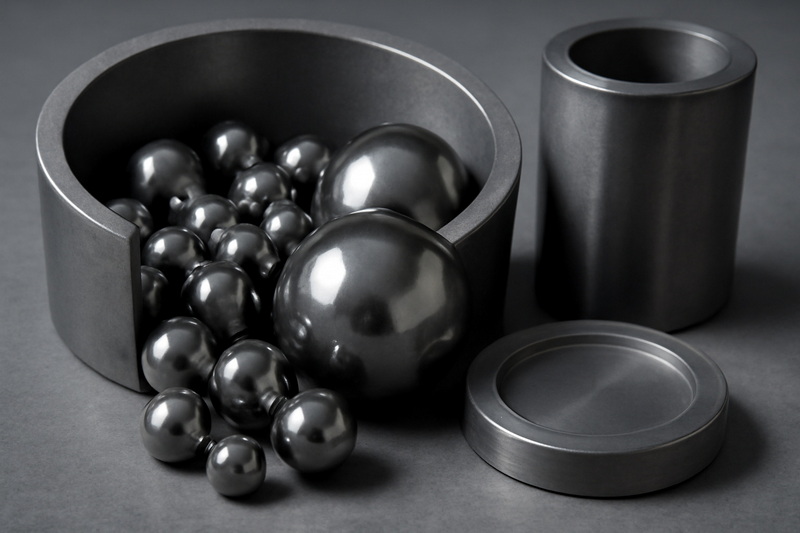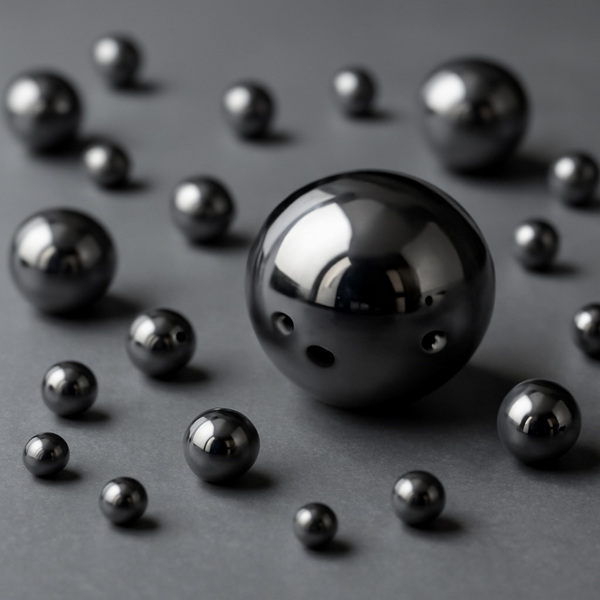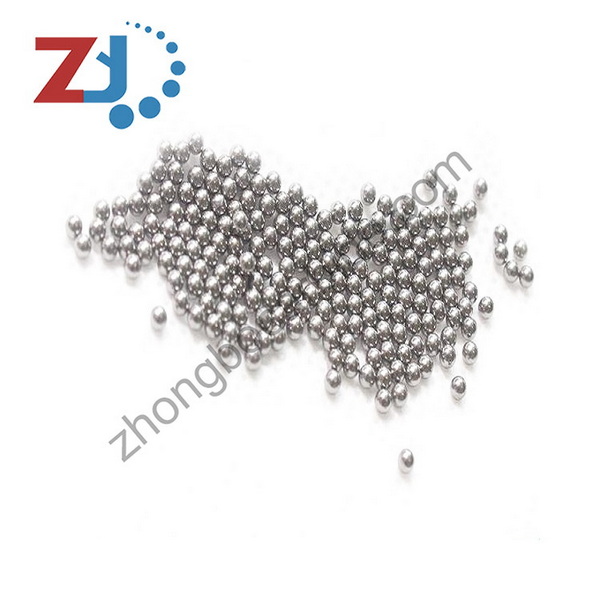Content Menu
● What Are Tungsten Carbide Balls?
>> Key Features:
● Common Applications of Tungsten Carbide Balls
● Where Can I Buy Tungsten Carbide Balls?
>> 1. Zhongbo Tungsten Carbide Balls
>> 2. Abbott Ball Company
>> 3. KoneCarbide
>> 4. ACER Racing
>> 5. Reid Supply
>> 6. Swiss Jewel Company
>> 7. Fisher Scientific (Cole-Parmer)
● How to Choose the Right Tungsten Carbide Ball?
● Manufacturing Process of Tungsten Carbide Balls
● Quality Control and Testing
● Environmental Impact and Sustainability
● Future Trends in Tungsten Carbide Balls
● Conclusion
● Frequently Asked Questions (FAQ)
>> 1. What sizes of tungsten carbide balls are commonly available?
>> 2. What does the grade of a tungsten carbide ball mean?
>> 3. Can tungsten carbide balls be customized?
>> 4. Are tungsten carbide balls magnetic?
>> 5. What industries commonly use tungsten carbide balls?
Tungsten carbide balls are highly sought-after components used in a variety of industrial, scientific, and commercial applications due to their exceptional hardness, wear resistance, and durability. Whether you need them for precision bearings, milling, aerospace controls, or specialized mechanical parts, knowing where to buy high-quality tungsten carbide balls is essential. This comprehensive guide will walk you through the best sources, key specifications, buying tips, and frequently asked questions about tungsten carbide balls.

What Are Tungsten Carbide Balls?
Tungsten carbide balls are spherical components made primarily from tungsten carbide powder bonded with a metallic binder, usually cobalt. This combination creates a material that is extremely hard, dense, and resistant to abrasion, corrosion, and deformation. These properties make tungsten carbide balls ideal for applications where durability and precision are critical.
Key Features:
- Hardness: Mohs hardness around 8.5, with Rockwell hardness typically in the range of 89-92 HRA.
- Density: Approximately 14.5 to 15 g/cm³, making them very heavy for their size.
- Wear Resistance: Excellent resistance to wear and abrasion.
- Temperature Resistance: Can withstand temperatures up to about 800°F (427°C).
- Precision: Available in various grades, with Grade 10 and Grade 25 being common for high precision.
Common Applications of Tungsten Carbide Balls
- Ball Bearings: Used in high-performance bearings for aerospace, automotive, and industrial machinery.
- Milling Media: Ideal for grinding and milling applications due to their hardness.
- Valves and Actuators: Provide reliable performance in control systems and hydraulic valves.
- Precision Instruments: Used in coordinate measuring machines (CMM), dial indicators, and flow meters.
- Audio Equipment: Employed in high-end audio isolation devices for improved sound quality.
Where Can I Buy Tungsten Carbide Balls?
There are several reputable suppliers and manufacturers where you can purchase tungsten carbide balls, ranging from industrial distributors to specialty manufacturers. Below are some of the best options:
1. Zhongbo Tungsten Carbide Balls
Zhongbocarbide.com offers a wide range of tungsten carbide balls in various sizes and grades. They stock balls from very small diameters (around 0.03 inches) up to larger sizes, with prices varying depending on size and grade. They provide both standard and custom options, including ground and unground balls suitable for different applications.
- Sizes: 0.03" to over 0.05"
- Grades: 25 and better
- Price range: Approx. $6 to $23 per ball depending on size and quantity
2. Abbott Ball Company
Abbott Ball specializes in tungsten carbide balls tailored for aerospace, automotive, medical, and industrial applications. They offer sizes from 0.5 mm up to 1.25 inches and provide custom solutions with different grades (10, 25, 100) to meet specific needs.
- Known for superior quality and durability
- Custom manufacturing available
- Applications: aerospace controls, automotive valves, medical devices
3. KoneCarbide
KoneCarbide supplies both ground and unground tungsten carbide balls with diameters ranging from 0.4 mm to 60 mm. They offer customization services and recommend Grade GM23 carbide for wear resistance and toughness.
- Custom sizes and grades
- Suitable for ball valves, hydraulic bearings, and grinding components
4. ACER Racing
ACER Racing sells tungsten carbide balls in packs, such as 12 pieces of 1/8" balls, with worldwide free shipping on orders over $40. They cater to hobbyists and industrial users alike.
- Convenient pack sizes
- Competitive pricing
- Fast shipping options
5. Reid Supply
Reid Supply stocks tungsten carbide balls in various diameters with Rockwell hardness around 90.5-91.5 HRA. They provide detailed product specifications and stock levels for immediate purchase.
- Sizes from 2.5 mm to over 11 mm
- Grade 25 precision
- Suitable for bearings and wear applications
6. Swiss Jewel Company
Swiss Jewel offers tungsten carbide balls with precision ground to a sphericity of 0.625 microns and diameters from 0.13 mm to 20 mm, with larger sizes available on request. They specialize in custom optical and mechanical components.
- High precision for demanding applications
- Custom size and finish options
- Applications in CMM probes, hydraulic valves, flow meters
7. Fisher Scientific (Cole-Parmer)
For laboratory milling applications, Fisher Scientific sells tungsten carbide grinding balls compatible with their tungsten carbide grinding vial sets. These balls are valued for their abrasion resistance and efficiency in sample milling.
- Sizes like 11.2 mm available
- Used in lab milling equipment
How to Choose the Right Tungsten Carbide Ball?
When selecting tungsten carbide balls, consider the following factors:
- Size: Match the diameter to your application requirements.
- Grade: Lower grade numbers (e.g., Grade 10) indicate higher precision and roundness.
- Surface Finish: Polished or ground surfaces improve performance in bearings and precision instruments.
- Quantity: Buying in bulk often reduces cost per ball.
- Coatings: Some balls come with coatings like titanium nitride for enhanced wear and corrosion resistance.
- Supplier Support: Look for suppliers offering technical assistance and customization.

Manufacturing Process of Tungsten Carbide Balls
The manufacturing of tungsten carbide balls involves several precise steps to ensure the final product meets stringent quality and performance standards. The process typically starts with mixing tungsten carbide powder with a metallic binder, usually cobalt, to form a composite material. This mixture is then pressed into spherical shapes using specialized molds or pressing equipment.
Following the initial shaping, the balls undergo a sintering process where they are heated to high temperatures in a controlled atmosphere. This step fuses the tungsten carbide particles and binder together, resulting in a dense and extremely hard material. After sintering, the balls are ground and polished to achieve the desired size, roundness, and surface finish.
Advanced manufacturing techniques such as hot isostatic pressing (HIP) and precision grinding are often employed to enhance the mechanical properties and dimensional accuracy of the balls. These processes ensure that the tungsten carbide balls can withstand demanding applications in various industries.
Quality Control and Testing
Quality control is critical in the production of tungsten carbide balls to guarantee their performance and reliability. Manufacturers employ rigorous testing methods including hardness testing, sphericity measurement, and surface finish inspection.
Hardness is typically measured using the Rockwell or Vickers scale to confirm the balls meet the required specifications. Sphericity, or the degree to which the ball is perfectly round, is measured using optical or tactile instruments to ensure minimal deviation, which is crucial for precision applications.
Surface finish is inspected visually and with specialized equipment to detect any imperfections or defects. Some manufacturers also perform non-destructive testing such as ultrasonic or X-ray inspection to identify internal flaws.
Environmental Impact and Sustainability
The production and use of tungsten carbide balls have environmental considerations that manufacturers and users should be aware of. Tungsten carbide is a hard and durable material, which contributes to longer product life and reduced waste in applications.
However, the mining and processing of tungsten and cobalt, the primary raw materials, can have significant environmental impacts including habitat disruption and pollution. Efforts are being made in the industry to source materials responsibly and improve recycling methods.
Recycling tungsten carbide balls and scrap material is becoming more common, helping to reduce the demand for virgin raw materials and minimize environmental footprint. Sustainable practices in manufacturing and supply chain management are increasingly prioritized by leading suppliers.
Future Trends in Tungsten Carbide Balls
As technology advances, the demand for tungsten carbide balls with enhanced properties continues to grow. Research is focused on developing new composite materials and coatings that improve wear resistance, corrosion resistance, and thermal stability.
Nanotechnology and advanced surface treatments are being explored to create tungsten carbide balls with superior performance in extreme environments. Additionally, additive manufacturing techniques may offer new possibilities for custom shapes and integrated components.
The expanding use of tungsten carbide balls in emerging industries such as renewable energy, medical devices, and precision robotics highlights their importance and potential for innovation.
Conclusion
Tungsten carbide balls are indispensable components in many high-performance and precision applications due to their exceptional hardness, wear resistance, and durability. Whether you are an engineer, hobbyist, or researcher, finding a reliable supplier that offers the right size, grade, and quantity is key to ensuring optimal performance. Reputable suppliers like Precision Balls, Abbott Ball, KoneCarbide, and Reid Supply provide a broad selection of tungsten carbide balls, including custom options to meet specialized needs. By understanding the specifications and applications, you can confidently purchase tungsten carbide balls that deliver superior results for your projects.

Frequently Asked Questions (FAQ)
1. What sizes of tungsten carbide balls are commonly available?
Tungsten carbide balls are available in a wide range of sizes, typically from as small as 0.03 inches (about 0.8 mm) up to several centimeters or more. Common sizes for industrial use range from 1 mm to 20 mm in diameter, with custom sizes available upon request.
2. What does the grade of a tungsten carbide ball mean?
The grade refers to the precision of the ball's roundness and size uniformity. Lower grade numbers indicate higher precision. For example, Grade 10 balls are more precise and uniform than Grade 25 or Grade 100 balls. Higher precision is important for applications requiring minimal vibration and maximum performance.
3. Can tungsten carbide balls be customized?
Yes, many suppliers offer custom manufacturing services where you can specify size, grade, surface finish, and even coatings to meet your specific application needs.
4. Are tungsten carbide balls magnetic?
Tungsten carbide balls themselves are not magnetic, but some small diameter balls can be picked up with a magnet due to the cobalt binder used in their manufacture.
5. What industries commonly use tungsten carbide balls?
They are widely used in aerospace, automotive, medical devices, oil and gas, industrial manufacturing, precision measurement instruments, and high-end audio equipment.
















